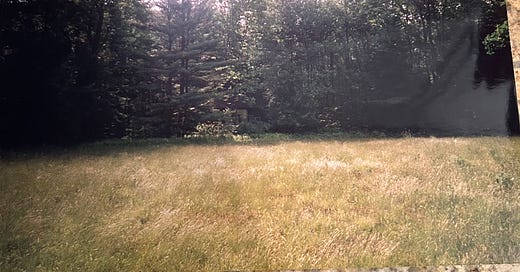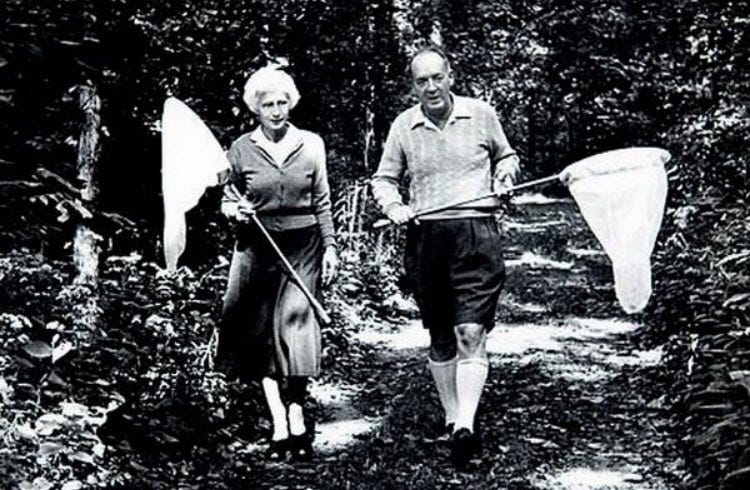In the summer of ‘99, I did my writing in a cabin in the woods. I wasn’t the Unabomber—I’d been given the cabin as part of a fellowship at the MacDowell Colony in New Hampshire—but that’s not to say I wasn’t going a little nuts. I was working on my first novel, a book I would wrestle with for seven years before abandoning, and, like most first novels, it was both utterly consuming and totally elusive. I couldn’t get my arms around it, kept endlessly altering the point-of-entry or the point-of-view without ever seeming to get to the heart of it. But I’d been awarded the fellowship at a fateful moment. I’d recently departed from my job at 20th Century Fox, and one afternoon I trudged home along Atlantic Avenue in Brooklyn in after having spent a long morning at the unemployment office. My two hour wait in line had resulted in the woman at the window telling me that I was exactly one day too late to be eligible for benefits, and hence I was in a state of total abjection: unemployed, unpublished, too dumb (or at least too careless) even to claim benefits to which I’d realized too late I might be entitled. I was recently engaged (you’d think this would be good news, but my sudden financial freefall made this a further condition of panic), and there it was in my mailbox: a letter offering me two months of free room-and-board along with the validation (I needed that too, maybe most of all) the fellowship also provided, so off I went to the wilds of New Hampshire.
(The view from my window at Schelling Studio1, Peterborough, New Hampshire)
The fellowship didn’t solve my problems. The book was just as elusive there as it had been in Brooklyn, but . . . each day as I sat down in my cabin I would look out the window and often see another one of the writers in residence flailing around with a butterfly net. It was a wonderful, comic sight, as Lewis—this was his name—was a stocky, cherubic dude in late middle-age with Coke-bottle glasses, almost unspeakably pallid and unathletic. The sight of him out there awkwardly waving his net (he didn’t appear to be very good with that thing) never failed to cheer me up, and eventually, after a week or so of eating dinner together and having my ass ritually kicked at the colony’s communal pingpong table (he was very, very, very good at that, it turned out), I asked him what he was doing. “I’m writing a book about butterfly hunting,” he said. “Like Nabokov?” I asked him. “No, no,” he said. “I’m not really interested in butterflies themselves. I’m interested in that anticipatory state that collectors experience before they catch anything. The catching itself is sort of beside the point.” As someone who spent a lot of time back then hunting for treasure in both book- and record stores that state was familiar to me, and so I was intrigued, but the book never appeared. Instead, Lewis—Hyde, was his last name—eventually wound up publishing a book called Common As Air, which was a history and a defense of the idea of a public commons, an argument against the enclosure of intellectual property.
I’ve been thinking about this a lot lately, about the disappearance of public spaces both virtual and physical that are not enclosed. By “not enclosed,” of course, I mean genuinely free from commercial encroachment, which none of our present approximations of a public square2—ghoulishly erosive for-profit engines all—are remotely. If you were to ask me where the despair that pretty much every sentient American feels at the moment (provided they’re not too rich, evil, or self-deluded to admit it to themselves, though I suspect even the rich and the evil feel it somewhere) originates, I would say it’s through the absence of a functioning public commons. Obviously there are other reasons, with which we should all be amply familiar by this point, and if you want to test your own conscience (but not if you want to sleep well tonight) you can go ahead and click here, but I would argue that even this particular horror largely sustains itself through the absence of a true public commons, and that the most perverse aspect of our contemporary situation remains the coopting of “free speech” discourse—in fact, of the very idea of “freedom” itself—by libertarian assholes who are fundamentally obsessed with privatization. Somewhere in The Golden Hour I make the case that the American cinema of the 20th Century was, in effect, a public commons, which is both true and untrue: “true” in the sense that a collective dream life, and a conversation about that dream life happening both inside the fourth estate and beyond its margins, cannot possibly be owned by anybody; wildly untrue, of course, insofar as both the movies themselves and the fourth estate were likewise for-profit engines. But I do believe that the erosion of that public dream life’s quality (insofar as movies, just like books, TV shows and other creative artifacts, are shaped and shepherded by publishers and platforms that have given up thinking about anything other than profit) and of the fourth estate are together the source of more misery, and are a greater amplifier of individual loneliness, than is usually assumed. When people say the movies (or the novel, or jazz, or anything else) are “dead,” this is what they mean: that the culture makes no space for them, and so, by extension, none for an intimate, noncommercial response.
All this crossed my mind yet again yesterday in reading this excellent, excellent Substack by Marco Roth. Nominally about a bad building in New York City, Roth’s piece is more fully about the enclosure of public space in an urban landscape and about what he aptly calls “the privatization of reality” by billionaires. Reality, of course, is the one thing that cannot be “privatized,” as each of these billionaires will learn whenever they run out of blood boys and whatever individual bomb, bullet, or terminal illness that is (inevitably, inescapably) headed for each arrives, but for now we are forced to pretend under their terms that it can be, and to trudge along with our headphones, our Netflix- and Spotify subscriptions, our daily doses of whatever algorithmic slop the platforms allow us3 , but for how long, exactly? “Everybody knows there is no fineness or accuracy of suppression,” Saul Bellow wrote in a novel I first read that summer at MacDowell (“if you hold down one thing you hold down the adjoining”), and in his 1983 book The Gift—which I read as soon as I got home from MacDowell and could snag Lewis’s books for myself—my butterfly-net-wielding friend writes “If, when we work, we can look once a day upon the face of mystery, then our labor satisfies. We are lightened when our gifts arise from pools we cannot fathom. Then we know they are not a solitary egotism and they are inexhaustible. Anything contained within a boundary must contain as well its own exhaustion. The most perfectly balanced gyroscope slowly winds down.”
Those italics, in fact, are mine, but that passage speaks soundly (as Hyde’s work in general does) to the limitations inherent in market oriented thinking, and of that dream (or nightmare, really) of infinite growth these vampires choose so avidly to imagine. I haven’t seen Lewis now for decades, but his books—particularly Common as Air and The Gift (subtitle: Imagination and the Erotic Life of Property)—remain worthwhile. If that passage’s vaguely spiritual air (“the face of mystery,” etc) now seems—also—kinda cringe, I’d argue that this not down to the qualities of Lewis’s writing or his argument but is, rather, just another example of what we’ve lost. If it’s no longer entirely possible to speak of “artistic gifts,” or of the idea that one might pursue them for reasons other than money4, without a modicum of embarrassment, I’d ask you . . . why, exactly, do you suppose that is? Who, exactly, has foreclosed upon that aspect of the discourse, and to what end?
I’ll leave you all with holiday wishes, with the hope that whatever gifts you have or will exchange throughout the season are amply of the nonrefundable, pricetag-free variety—that what Lewis Hyde calls their “gift economy” value equals or exceeds their market value—and that our plutocrats will each be visited by three ghosts5, and with this song here by an old schoolmate of mine, which I had a long and memorable argument with my now-ex-wife about just as our marriage was coming to an end. She thought it was only a petulant complaint about a musician not getting paid for her labor where I said it was about the obligations one has to one’s talent, the impetus to make music whether or not one is paid for it. She may have been right. But I still think the song—just like you, and just like I do too—knows better.
Until soon—
One entertaining tradition MacDowell had—I would assume, still does—was having each fellow carve their name onto a series of wooden plaques that hung on the wall. My immediate predecessor in Schelling was Jonathan Franzen, who presumably had used the time to finish up The Corrections. One other notable name among them many—the plaques went back decades—was Yoko Ono, but no one at the Colony was able to confirm at the time whether she’d actually been there or if it was someone else’s daffy, Situationist-style prank.
Very much including this here platform, Substack, alongside Twitter, InstaMetabook (or whatever it’s calling itself these days), BlueSky (let’s not kid ourselves), etcetcetcetc.
One thing Lewis Hyde and I did with a handful of others was drive in one night to the town of Peterborough to watch The Matrix, which was just then in theaters. He hated it, if I recall correctly, but it’s amazing how much of the actual future, 2025’s reality, is metaphorically encoded in that movie
One of the reasons this Substack remains free—I’ll bury this down here so the hand of my agent, editor, or publicist doesn’t erupt from the screen to strangle me outright—is because of my stubborn conviction that all art, or anything that aspires to art, wants to remain free. I’d rather people steal my books than not read them at all, and in fact would be more pleased than enraged by anyone who did. That’s not the same thing as believing artists shouldn’t get paid, however, and anyone who asks me to write for free, or for below my decided market value, can piss up a rope. The disjunct between these two principles is, in large part, what The Gift is actually about.







Lewis Hyde was scheduled to give a reading at the Hammer at the beginning of Covid. I was disappointed when it was canceled. The Gift has been a favorite read since my boss at the used bookstore where I worked gave me a copy over a decade ago. Something permanently shifted in me, after reading it. Finally read the copy of A Primer for Forgetting I was going to ask Hyde to sign at the Hammer, and it is excellent, too.
Agreeing so much with the spirit of this. I think so often of the shrinkage of movies, how they no longer occupy the center of pop culture, how they transformed from stories about the “everyperson” we might see ourselves in, experiencing extraordinary things, into stories about branded characters possessing extraordinary powers, who most of us can’t identify with, and which are effectively tales of celebrities.